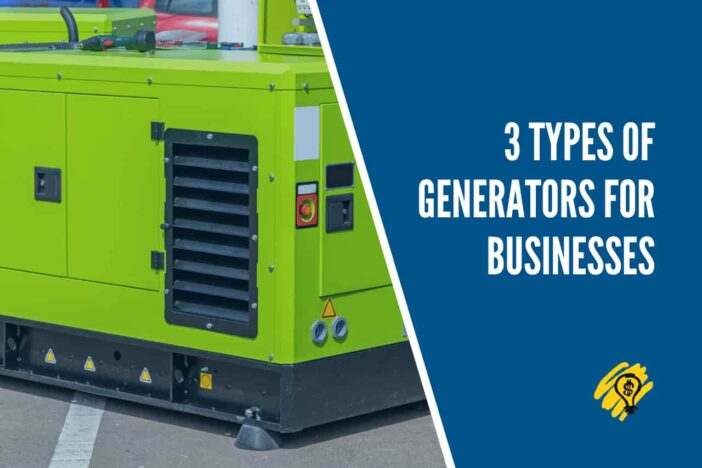As a business owner, the last thing you want to experience on your company premises is a power interruption. When it happens unexpectedly, it may adversely affect your business operations. It can disrupt your company’s work hours and shut down your office devices and equipment, resulting in significant productivity loss. This is where the use of generators comes into play.
Essentially, generators are equipment used to provide temporary power supply to homes and business establishments. They utilize the process of electromagnetic induction to generate mechanical energy and transform it into electricity. Since they serve as an alternative to the current electricity supply, your business can benefit from using generators in places with frequent power outages.
However, it’s essential to know that generators used for businesses come in three types. These can include:
1. Diesel Generators
Generally, diesel generators use a diesel engine to produce emergency power when there’s a power interruption. They come in various designs, models, and sizes, making them suitable for your business needs. The industrial version of diesel generators is bigger and can produce a considerable amount of power for an extended time.
Moreover, they can provide electricity to office appliances, such as computers, multiple ceiling fans, air conditioning systems, and other power tools used in the business premises. For example, diesel generators, such as the Kubota generator and other similar brands in Australia or within your location, serve as effective power generation solutions for different commercial applications.
However, like other equipment, using these industrial generators has advantages and disadvantages that you need to consider before buying. Some common benefits can include:
- They’re cost-efficient since they have a lower price, and they need less maintenance and replacement of essential components.
- They’re fuel-efficient since the diesel engine can produce more electric energy from the diesel fuel, providing them with a longer running time.
On the other hand, diesel generators may cause a problem in the following manner:
- They’re heavier and larger in size, making them difficult to install in commercial establishments by yourself. But, you can hire a generator installation service provider to handle the job for you.
- They release fumes, which can cause some health problems if they’re used indoors without proper ventilation.
2. Natural Gas Generators
Natural gas generators are also another common power generation solution used for businesses and other commercial purposes. They utilize natural gas to generate electricity to supply large facilities, including nursing homes and hospitals. They’re also fuel-efficient as they burn natural gas with little waste like diesel generators. Also, since natural gas is available worldwide, the generators powered by this substance can be a perfect power backup for business regardless of size and location.
However, choosing natural gas generators over the other options also has upsides and downsides. Some common benefits can include:
- They’re less expensive since natural gas comes at a lower price than diesel and propane.
- They’re eco-friendly as they also produce less noise when running, making them an ideal alternative power source for commercial spaces.
- There’s no danger of leaks within your business premises as the tank automatically shuts down when it runs out.
On the other hand, natural gas generators may not be beneficial in the following ways:
- The natural gas used for this type of generator is highly flammable, so caution is necessary when running them.
- They can be unsafe since they emit harmful contaminants and cause health issues when installed inside the building and near the ventilation systems.
3. Propane Generators
Another type of generator used in businesses is the propane counterpart. They utilize propane as a fuel to produce electricity. They’re known as portable generators because propane can be quickly injected into the equipment in the form of liquid or gas. Also, since propane generators convert more than 50% of propane to electricity, they can become an abundant energy source for your business during complete blackouts and more prolonged power outages. Spilling isn’t a problem when you keep them in a container because they have security valves that ensure their safety.
But, like the diesel generators, the propane counterparts can also be advantageous or disadvantageous. In most cases, they’re beneficial due to the following:
- They release a low amount of hazardous substances.
- They can last for a long time, approximately two years, without ignition problems.
- They’re suitable for running commercial devices and equipment due to their high fuel efficiency level.
On the other hand, using propane generators is disadvantageous due to the following:
- They have a complicated fuel system, making them challenging to fix.
- They can become unsafe if the person operating them isn’t trained enough to do so.
- They’re more expensive to purchase and operate compared to diesel generators.
Bottom Line
There are various types of generators available today. But, when it comes to business or commercial use, the options mentioned above are the most common ones due to their ability to provide an adequate supply of alternative electricity to large appliances and buildings.
Therefore, if you want your business to operate despite some management risks, such as power interruptions, choose the right industrial generator for your company premises. Conduct thorough research and consider your business needs before buying one. That way, you can ensure the one you pick is worthy of your investment.





